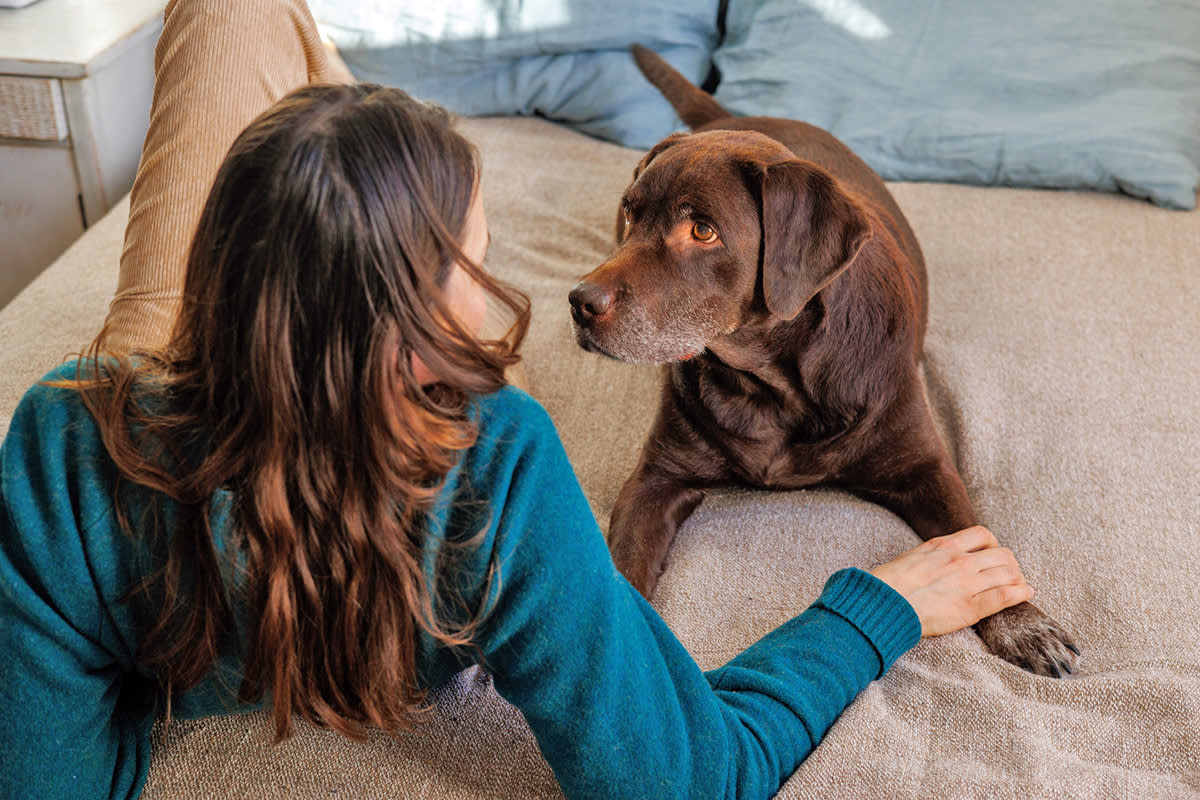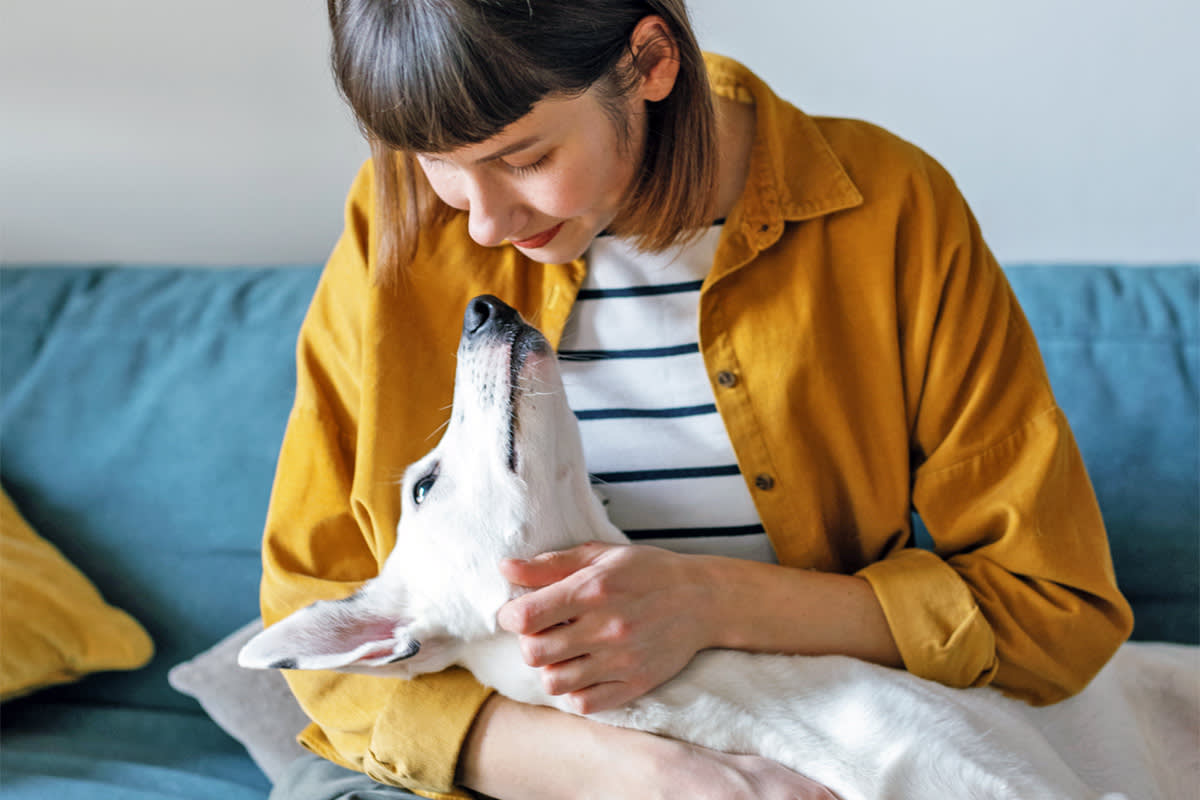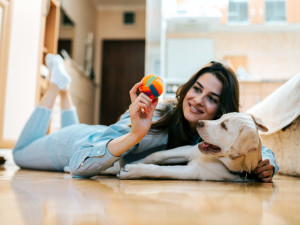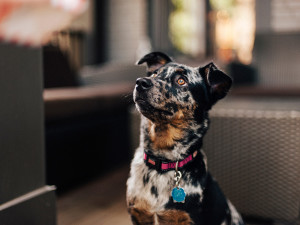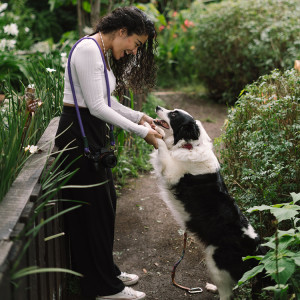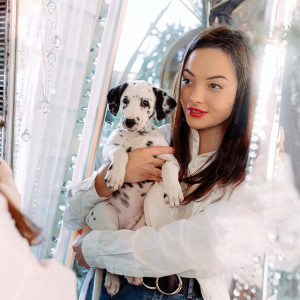Does Your Dog Really Understand When You Say Words Like “Walk” or “Dinner”?
Spelling words out that may get dogs excited like they are kids has become a thing.

Share Article
As dog parents, we dote on our pups constantly, obsess over their every move, and maybe buy them cute little outfits for special occasions. And just like those who’ve sired human offspring, we, too, tend to develop a list of words to avoid saying in front of our babies.
While people with kids might spell out things like “i-c-e-c-r-e-a-m” to dodge certain meltdowns after dinner, dog parents often become walking thesauruses for words like “walk,” “outside,” and “dinner.” The logic here is fairly obvious. No one likes a tease, including our pups. (Have you ever seen your dog’s face when they mistakenly expect a treat? I wouldn’t wish that heart-piercing look of betrayal on anyone!) And so, guided by the fear of disappointing our best friends, we bust out the synonyms or our spelling-bee skills.
When I want to know if my boyfriend is ready to go outside with the dogs, I never actually use those words. Instead, I’ll throw out a casual, “Do you want to go downstairs?” The word “dinner” often gets spelled out — “d-i-n-n-e-r” — or we’ll get creative and use something like “chow.” The system is foolproof, but I’ll admit, I sometimes wonder if it’s actually necessary. My dogs generally ignore much of what I say — including, sometimes, when I actually want their attention. Are they really going to notice or care if I use the word “beach” and do not immediately pack their portable bowls and towels into the station wagon?
As with so many pet-care questions, the answer is, “It depends.” According to the experts I spoke with, your dog’s reactivity will likely come down to how you usually communicate.

Will your dog be disappointed if they hear “outside” and don’t get to go outside?
Anecdotally, yes — probably. But not for long. According to Eileen Koval, certified dog behavior consultant with the International Association of Animal Behavior Consultants, our dogs “may feel stressed or even tricked if we have created such strong meanings and powerful emotions by repeatedly using the word in conjunction with a certain activity” and then do not complete the expected activity.
“If dogs are already at a place where they seem disappointed or confused,” Koval says, “it can be helpful to direct them to another enjoyable activity.” If the issue arises repeatedly, you might want to avoid using the word altogether.
Fortunately for us, dogs have shorter memories than we do, so rest assured, if you say the word “dinner” around your dog and fail to deliver one time, they likely won’t be scarred for life.
Will your dog stop trusting you after multiple misunderstandings?
Possibly, but not necessarily.
According to Koval, dogs can sometimes begin to mistrust us over time if we repeatedly stoke their expectations and then don’t deliver. “They may begin to ignore other things that the human says,” she warns, or fail to follow other cues we’ve trained.
“Trust is built initially through positive transactions — we say we will do something and then we follow through, or we ask them to do something and then we follow through with a reward,” Koval says. “When there are promises that are not kept (from their perspective) they eventually may lose trust.”
At the same time, Dr. Zachary Silver, director of Occidental College Canine Intelligence Lab, says context matters. “Hopefully, people aren’t getting their dog’s attention, saying ‘walk,’ and then not taking them for a walk,” he says. “Hopefully, this is coming from the context of eavesdropping, in which case, maybe they become a bit more discerning about when they respond. They start to recognize that that word only carries meaning for them when it is used with dog-directed speech.”
As with most aspects of dog training, the key here is consistency. To keep your dog’s trust, help them understand what speech is meant for them and what is not. Reward them when they respond correctly, and redirect their energy toward something more productive when they’re disappointed. And if all else fails, you can always go back to spelling things out.
Do dogs actually understand human speech?
Yes and no.
According Silver, there are different schools of thought on this question. That said, the bulk of the evidence suggests that dogs can form associations between words and concepts through repetition.
“So if you say ‘outside’ every time you take your dog outside, they’ll eventually learn what that is,” Silver says. “...But it really is based on the association between the word that you’re saying and that next step.”
Still, dogs’ brains don’t work the same as ours. They take longer to learn new words, and they don’t have the linguistic flexibility to understand the difference between, say, “Do you want to go outside?” and “Do you want to go outside in an hour?” In that sense, we need to be deliberate in how we speak around them.
The best way to communicate with your dog is through something called “dog-directed speech,” and the good news is, many of us do this automatically. You know that dog voice we all have, where we raise our timbre and perhaps speak slower than usual? That’s a hallmark of dog-directed speech, alongside two other tools — establishing eye contact and starting sentences with their names. For example: “Lucky, do you want to go outside?”
Dogs pick up new words faster when taught through dog-directed speech, and according to Silver, this way of talking to them can also serve as a potential deterrent for the eavesdropping that we mentioned above — that is, dogs listening to our conversations and picking out relevant words. So, if you want to be able to use words like “dinner” and “beach” in casual conversation, make sure to only use dog-directed speech when teaching your dog new words. The rest of the time, use these words like normal so that your dog can learn the distinction.
Are our dogs always listening?
This is where the “it depends” part comes into play. Every dog is different, and so is their level of attentiveness. It also matters how you normally communicate with your dog.
“If you primarily communicate with your dog using dog directed speech, then they'll likely only interpret those words as being salient to them when you’ve produced that similar speech directed towards them,” Silver says.
On the other hand, there’s always a chance that dogs’ word associations will grow strong enough that they begin to pick them up in regular speech, especially if you often talk to them in your normal voice — something Koval has noticed with words like “dinner,” “park,” “walk,” and “ball.”
“I think it is important to continue using words in non-dog related contexts in normal tones of voice so that they can learn when the word is a predictor of something pertaining to them — and also when it is not a predictor,” Koval says.
If you use an exciting word around your dog and they don’t react, you can assume they don’t expect anything. In these situations, Koval says, “they likely hear the word just fine but do not have an over-emphasis on its meeting as always pertaining to them.” That kind of interaction is healthy.

Laura Bradley
Laura is a New York-based experienced writer and mom of two rescue pups. Her work has appeared in Slate, Vanity Fair, Daily Beast, The Washington Post, The Atlantic, Yahoo! News, Vulture, Grazia Magazine, and more. When she is not writing or walking the pooches, you will probably find her in the community garden.
Related articles
![Short-haired blonde woman in a tan sweater and blue jeans sitting on a bench talking to her Beagle mix dog who is looking up at her]()
How You Say Something to Your Dog Matters More Than What You Say
TikTok pet parents have made this clear: Tone matters. Celebrity dog trainer Nicole Ellis says dogs can hear “stress in our voice — whether directed at them or when they hear us talking to others.”
![Woman and her dog playing with a ball.]()
Your Dog Actually Knows the Words for Familiar Objects, Study Finds
Time for a “Proud Parent of a Canine Honors Student” bumper sticker.
Do Dogs Understand Our Words?
Say What? A look at the types of words that dogs understand.
![Young Latina Woman Enjoying The Companionship Of Her Dog In A Garden.]()
Is Your Dog Bilingual?
Your dog may understand other languages better than you think, according to a new study.
![]()
What Are Dog Communication Buttons? And How to Use Them
Cognitive Science professor Dr. Federico Rossano on how Bunny, TikTok’s “talking” dog, is sparking change in how we communicate with our pets.
![Woman and her Dalmatian puppy look in the mirror at their reflections.]()
Do Dogs Recognize Themselves in the Mirror?
Here’s why dogs know who they are more by smell than by sight.

